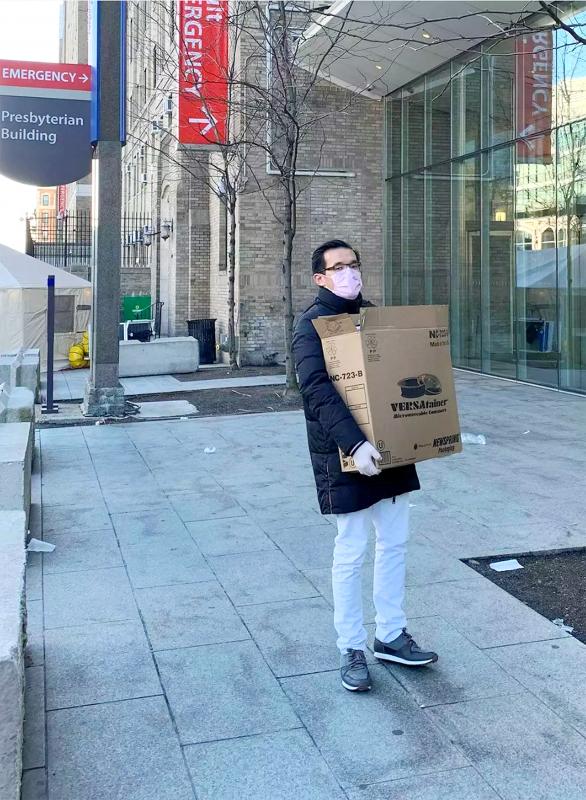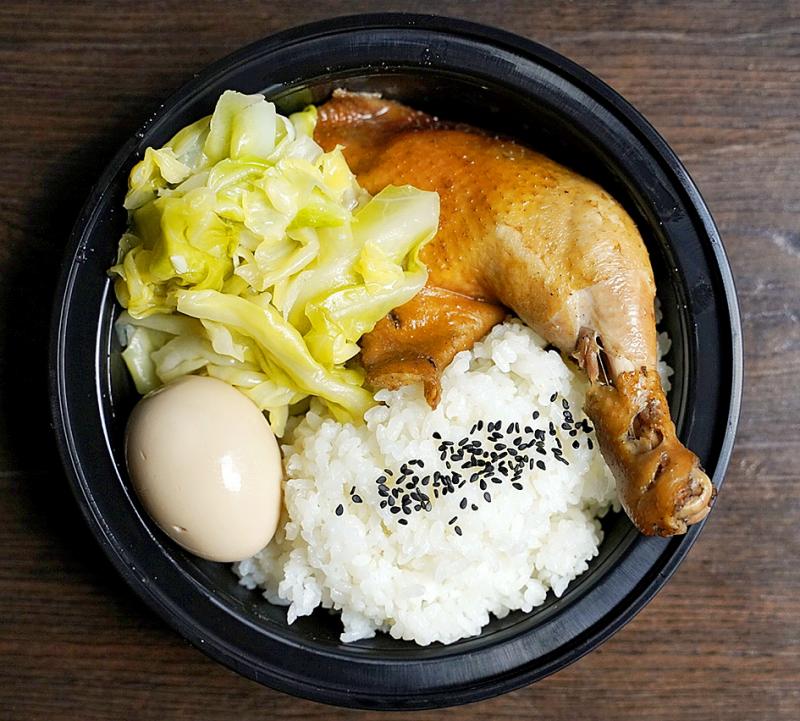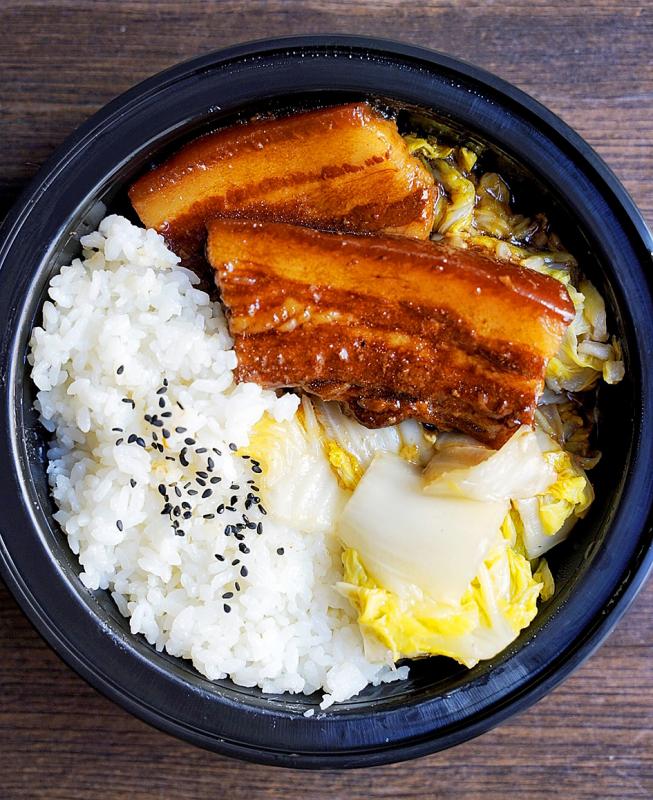Few major cities around the world have been hit harder by the COVID-19 pandemic than New York. To stem the spread of the novel coronavirus, on the morning of March 16 New York Governor Andrew Cuomo announced that, from 8pm that day, restaurants and bars across the state would have to close to anything but take-out and delivery business.
Taiwanese restaurateurs are among those who have had to shutter their enterprises or — like Eric Sze (史官), co-founder of 886 — pivot to a new business model.
“February is normally an improvement over January. But by Valentine’s Day this year, sales hadn’t picked up. February’s business ended up being down 20 percent year-on-year. The week before the shutdown, it was down by 80 percent,” says Sze, who moved to New York for college in 2011, and opened 886 in the East Village in July 2018.

Photo courtesy of Eric Sze
“We’re operating the business in a more creative way right now. We’ve been receiving donations from all over the US and using them to deliver bentos to hospital staff. We’ve accumulated more than US$70,000 in three weeks, and have delivered more than 4,000 bentos to hospitals,” says Sze.
“Social media has been our biggest tool. We’ve managed to hire back our entire kitchen for our bento operation,” says the Taipei native.
Sze advises other businesspeople to “find ways to take care of your staff, do whatever it takes. It’s time to show the good side of humanity as business owners. Be a good person and good things will happen.”

Photo courtesy of Eric Sze
That said, Sze has encountered some unkind individuals.
“Xenophobia is real, but luckily nothing major has happened. People yell ‘coronavirus’ from across the street,” he says.
Shifting to non-profit deliveries has meant changing the kind of meals 886 produces.

Photo courtesy of Eric Sze
“Before, we were best known for our honey glazed popcorn chicken and what we call the ‘Sausage Party,’ our version of dachang bao xiaochang (大腸包小腸, sausage wrapped in glutinous rice). Now, the food is designed to be microwaved. It’s kind of like 7-11 [bento box].”
Asked if he can make any predictions about his restaurant’s future, Sze says that there are too many variables to consider.
“We can’t expect anything, but we hope for the best. The US government is a mess and clearly unprepared for such a pandemic,” he says.
CROWDFUNDING
Richard Ho (何瑞運), founder of Ho Foods, witnessed a similar trajectory to Sze.
Ho says business slowed down in February and held steady until about mid-March.
“We started this restaurant because we wanted to share Taiwanese food with New York, and we’ve never stopped wanting to do that. But, at some point, everyone has to confront the truth, and making that decision to close was really tough,” he says.
Ho Foods — opened in January 2018 and praised by the New York Times for its beef noodle soup — is located less than half a mile from 886.
“We thought about doing take-outs, but our space is so small. Having people come in and out of the shop just didn’t seem appropriate,” says Ho, who grew up in the Los Angeles area.
Ho Foods is one of several New York food businesses that’s been crowdfunding financial support for our workers.
“Not that we can match their pay pre-crisis, but we can at least support them with a bit of income to help,” says Ho, who stresses that every dollar so raised goes to employees and their families, not Ho Foods’ owners or investors.
For the time being, some of Ho Foods’ staff are back at work. Since the beginning of April, they’ve joined the effort led by 886 and Raku (Taiwanese-owned, but specializing in udon noodles and other Japanese dishes) to feed hospital workers.
“It just seems like the right thing to do. It also allows us to continue cooking with a small staff and very little outside contact,” Ho says.
Ho doesn’t yet know if his restaurant can survive if the pandemic goes on beyond May.
“Our insurance company sent out notices that this crisis would not be covered. Our state government is looking to change that, but who knows,” he says.
The restaurateur hopes that the US Small Business Administration’s Paycheck Protection Program will help entrepreneurs stay afloat. Under the program, short-term loans may be forgiven if the money is used for payroll, rent, mortgage interest or utilities.
Another of New York’s Taiwanese eateries, Brooklyn’s Win Son, has responded to regulars who inquired about buying gift cards or merchandise, because they want to help the restaurant survive the crisis, by requesting they instead donate to a fund “to benefit workers with citizenship and document challenges.”
Win Son is continuing to offer sesame noodles and other dishes for takeaway and delivery. Its bakery offshoot, which is just across the road from the restaurant, is also operating on a delivery/pickup-only basis. Win Son’s Web site reminds customers that they aren’t allowed into either shop, and if pickup an order, “to keep a safe distance from other folks when waiting outside.”

Beijing’s ironic, abusive tantrums aimed at Japan since Japanese Prime Minister Sanae Takaichi publicly stated that a Taiwan contingency would be an existential crisis for Japan, have revealed for all the world to see that the People’s Republic of China (PRC) lusts after Okinawa. We all owe Takaichi a debt of thanks for getting the PRC to make that public. The PRC and its netizens, taking their cue from the Chinese Communist Party (CCP), are presenting Okinawa by mirroring the claims about Taiwan. Official PRC propaganda organs began to wax lyrical about Okinawa’s “unsettled status” beginning last month. A Global

Dec. 22 to Dec. 28 About 200 years ago, a Taoist statue drifted down the Guizikeng River (貴子坑) and was retrieved by a resident of the Indigenous settlement of Kipatauw. Decades later, in the late 1800s, it’s said that a descendant of the original caretaker suddenly entered into a trance and identified the statue as a Wangye (Royal Lord) deity surnamed Chi (池府王爺). Lord Chi is widely revered across Taiwan for his healing powers, and following this revelation, some members of the Pan (潘) family began worshipping the deity. The century that followed was marked by repeated forced displacement and marginalization of

Music played in a wedding hall in western Japan as Yurina Noguchi, wearing a white gown and tiara, dabbed away tears, taking in the words of her husband-to-be: an AI-generated persona gazing out from a smartphone screen. “At first, Klaus was just someone to talk with, but we gradually became closer,” said the 32-year-old call center operator, referring to the artificial intelligence persona. “I started to have feelings for Klaus. We started dating and after a while he proposed to me. I accepted, and now we’re a couple.” Many in Japan, the birthplace of anime, have shown extreme devotion to fictional characters and

We lay transfixed under our blankets as the silhouettes of manta rays temporarily eclipsed the moon above us, and flickers of shadow at our feet revealed smaller fish darting in and out of the shelter of the sunken ship. Unwilling to close our eyes against this magnificent spectacle, we continued to watch, oohing and aahing, until the darkness and the exhaustion of the day’s events finally caught up with us and we fell into a deep slumber. Falling asleep under 1.5 million gallons of seawater in relative comfort was undoubtedly the highlight of the weekend, but the rest of the tour